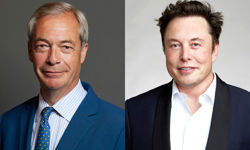Although the internet has been buzzing for a while with the names of those allegedly behind the super-injunctions, the issue came to a head for the nationals this week.
This was because they had at last a focus for their rage – a Twitter site set-up specifically to spill the beans on the famous names shielded by super-injunctions.
The Daily Mail on Monday named the site and told readers: “The social networking site Twitter today made a mockery of the celebrity trend for using privacy injunctions to hide their identity.”
It continued: "The move exposed the total inadequacy of court rulings which gag the press – but have no effective control over what is published online."
On Tuesday, the national press kept up its assault on super-injunctions claiming Twitter has humiliated the courts and made the injunctions look pointless by publishing the information judges say should be secret.
The Times asked: "What is the difference between a traditional news outlet and a website? If you are reading online, you might think that the answer is nothing. Yet, type another address at the top of your screen, and you could read of matters that The Times is legally prohibited from reporting. This is an absurd situation. It institutionalises the deception of the public, damages responsible media in favour of those with fewer qualms, and makes a mockery of the rule of law."
The Independent: "In what has been described as the "Spycatcher moment" of the internet era, a single user of Twitter has brought the culture of the super-injunction to its knees by drawing nearly 55,000 followers to a list of celebrities alleged to have links with the secretive gagging orders. The frenzy of activity on the micro-blogging site yesterday makes the super-injunctions as ineffective as the ban placed on publication of the autobiography of the MI5 officer Peter Wright in the mid 1980s."
Daily Mail: "Internet gossip has brought the whole existence of celebrity super-injunctions into jeopardy, legal experts warned last night. Millions of computer users have now found the leaked names of TV stars and footballers who believed the gagging orders would keep their sexual indiscretions secret. In addition, a report on the future of privacy law by a leading judge has been delayed amid the growing row over the controversial injunctions."
The Sun: "How appropriate that stars who behaved like twits should be exposed on Twitter. Once again Britain's medieval gagging orders look absurd as the internet hums with revelations newspapers are banned from repeating - even though newspapers got the stories in the first place."
The furore led to the Prime Minister David Cameron and Culture Secretary Jeremy Hunt both being questioned on the issue by an irate press – and both agreeing that Parliament should decide on privacy rather than leaving it to the courts.
Hunt said: “We are in this crazy situation where information is available freely online which you aren't able to print in newspapers. We are in a situation where technology, and Twitter in particular, is making a mockery of the privacy laws we have and we do need to think about the regulatory environment we have. In the end, I do strongly believe it should be Parliament, not judges, that decides where we draw the line on our privacy law'."
There was also speculation that the Government will seek to regulate social media like Twitter.
The problem is the press in the past has opposed privacy laws but the furore over super-injunctions has put it firmly back on the agenda.
Privacy law is notoriously difficult to frame and how do you regulate social media when it’s outside your jurisdiction?
If Twitter has made a mockery of super-injunctions, won’t it do the same to those protected by a privacy law?
These are complex issues than impinge on the law, self-regulation of the press and the Human Rights Act even before you try to police a social media that may be beyond the grasp of politicians.
There is no super-simple solution to the problem of super-injunctions.










